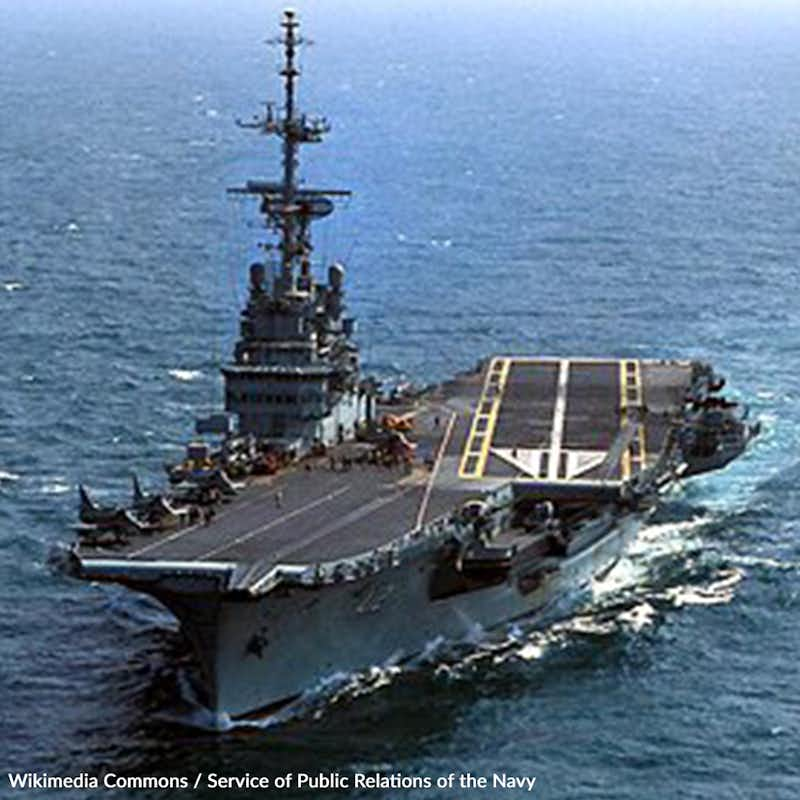Say No to Ocean Pollution and Stop Intentional Ship Sinking
886 signatures toward our 30,000 Goal
Sponsor: The Rainforest Site
The sinking of the São Paulo will have massive environmental consequences. Help us call for an end to this dangerous practice and protect our oceans!

The Brazilian Navy sank a decommissioned aircraft carrier, the São Paulo, in the south Atlantic. Despite warnings from environmental groups, the Navy went ahead with the sinking and it is now considered to have caused serious environmental damage1.
The São Paulo was packed with hazardous materials such as 760 tons of asbestos, more than 300 tons of PCB-contaminated material and heavy metals. These materials are now at risk of leaching into the ocean and contaminating the marine ecosystem2.
The sinking of the São Paulo is a violation of international environmental treaties such as the Basel Convention, the Stockholm Convention on Persistent Organic Pollutants and the London Convention & Protocol. These treaties aim to restrict the trade in hazardous waste between countries and promote control over marine pollution3.
The São Paulo was involved in France’s first nuclear tests in the 1960s and was later used in various regions, including Africa and the Middle East. Brazil purchased the vessel for $12 million in 2000 and had plans to scrap it, but those plans were stopped by Turkish environmental authorities in August4.
Over the coming decades, the sunken carrier will be leeching harmful compounds into the Atlantic, as well as worsening following negative impacts:
5. Release of toxic materials
The São Paulo was packed with hazardous materials, including an estimated 760 tonnes of asbestos, over 300 tonnes of PCB-contaminated material, and heavy metals. The release of these toxic substances into the ocean can have serious consequences on the health of marine life, including fish and other sea creatures5.
4. Marine pollution
Heavy metals and other toxic substances can leach into the water, polluting the marine environment and affecting the health of the ocean and its inhabitants. This could also have a significant impact on commercial fishing and seafood industries6.
3. Threat to marine life
The presence of a large sunken ship can attract marine life, which can become entangled in the debris or ingest toxic substances. This could cause harm to these creatures and impact the ecosystem in various ways7.
2. Harm to coral reefs
Coral reefs are home to an incredible diversity of marine life and play a critical role in maintaining the health of the ocean. The release of toxic substances from the São Paulo could harm these delicate ecosystems and negatively impact the species that depend on them8.
1. Loss of biodiversity
The ocean is home to a vast array of species, each with a unique role in maintaining a healthy and diverse ecosystem. The sinking of the São Paulo and the release of toxic materials into the ocean could lead to the loss of some species, further reducing the diversity of life in the ocean and affecting the ecosystem as a whole9.
It is important that we take action to protect this delicate ecosystem and prevent further environmental damage to our oceans. The sinking of the São Paulo is just one example of the dangers of recklessly discarding ships into the ocean10.
Sign the petition and call on the Commander of the Navy of Brazil to end the practice of sinking ships in the ocean!
- Steve Weinman, Divernet (6 February 2023), "New giant shipwreck – but who needs this one?"
- Yahoo! News (3 February 2023), "Brazil scuttles warship in Atlantic despite pollution concerns."
- MercoPress (11 May 2009), "UN Environment Program agreement to ban nine persistent organic pollutants."
- Marielle Descalsota, Business Insider (8 February 2023), "Brazil just sank its biggest warship into the Atlantic Ocean after failing to sell it for scrap metal. The ship was big enough to carry 39 aircraft — take a look."
- International Ship Recycling Association (2023), "Brazil deliberately sinks its toxic aircraft carrier in the Atlantic Ocean."
- Mohamed Lamine Sall, Abdou Karim Diagne Diaw, Diariatou Gningue-Sall, Snezana Efremova Aaron, Jean-Jacques Aaron, Environmental Science and Pollution Research (August 2020), "Toxic heavy metals: impact on the environment and human health, and treatment with conducting organic polymers, a review."
- NOAA Fisheries, "Entanglement of Marine Life: Risks and Response."
- Oceana, "Effects of Ocean Acidification on Corals."
- The Maritime Executive (2023), "COP15 Faces Conflicting Ideology Around Combating Biodiversity Loss."
- National Geographic Society, "Why the Ocean Matters."
The Petition:
To the Commander of the Navy of Brazil,
I implore you to end the intentional sinking of ships like the São Paulo. This recent act, carried out 190 nautical miles off the Brazilian coast, is not only a violation of international environmental treaties, but it also poses a serious threat to the ocean and marine life.
The São Paulo, an elderly decommissioned aircraft carrier, is packed with toxic materials such as an estimated 760 tonnes of asbestos, more than 300 tonnes of PCB-contaminated material, and heavy metals. These materials are highly dangerous and have the potential to leach into the water, contaminating the marine eco-system and causing harm to marine life.
I understand the challenges in disposing of decommissioned ships, but sinking them in the ocean is not the solution. It not only wastes millions of dollars in recyclable steel, but it also risks the lives of marine species and the ocean’s delicate balance.
I therefore ask that the Navy of Brazil take immediate action to end the intentional sinking of potentially dangerous ships. Instead, we ask that you take steps to properly dispose of decommissioned ships, and to ensure that they do not pose a threat to the ocean and marine life.
I hope that this petition will be taken seriously and that you will take the necessary steps to protect the ocean and its inhabitants.
Sincerely,